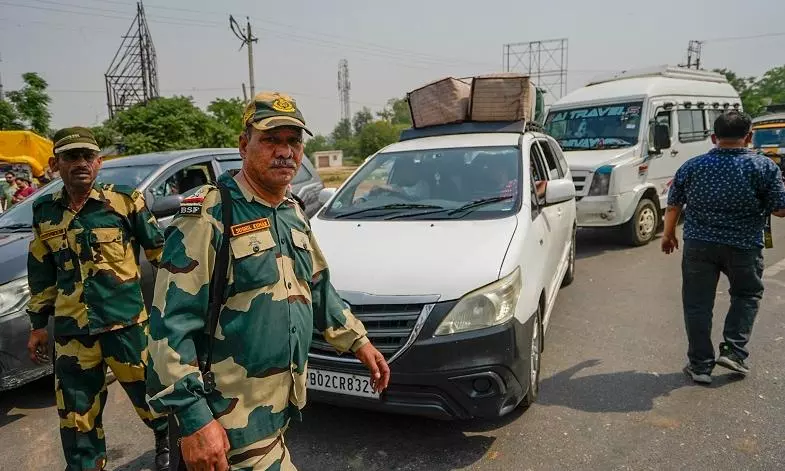
Security personnel at the Attari-Wagah border checkpost near Amritsar, Wednesday, April 30. India has announced the closure of the Attari border as part of heightened security measures following the Pahalgam terror attacks. PTI
Pahalgam attack | Terrorists still hiding in the area: Reports
The fact that the terrorists don’t have to leave the area for daily supplies points to the need for external logistical support, likely provided by Pakistan

Days after the Pahalgam terror attack in Kashmir, which left 26 persons dead, the four terrorists who carried out the massacre are likely still hiding in the area despite the massive manhunt to track them down, the National Investigation Agency (NIA), heading the probe, said, according to a report.
'Self-reliant'
According to the NIA sleuths, the terrorists have been able to evade capture for so long is perhaps because they may be “self-reliant” or carrying provisions. This enables them to stay hidden in dense forests for days and evade detection by security forces, an NDTV report said, citing sources.
The very fact that the terrorists don’t have to leave the areas for daily supplies brings to the fore the need for external logistical support, which is most probably being provided by Pakistan. India has repeatedly accused Pakistan of being involved in the Pahalgam terror attack, an allegation which the neighbouring country has denied.
Also read: After Pahalgam attack, Pakistan increases security for Hafiz Saeed: Report
Recced four locations
According to the report, the perpetrators of the massacre were present in the Baisaran Valley, a tourist destination near Pahalgam, at least 48 hours earlier.
Overground workers (OGW) interrogated by the NIA revealed that the terrorists had recced four locations, but backed out due to heavy security deployment.
Also read: Kashmir tourism picks up haltingly but closure of sites disappoints
Advanced equipment
The terrorists might be using cutting-edge communication equipment that does not require any SIM cards and enables them to communicate through short-range encrypted transmissions, experts said. They said it makes it extremely difficult to intercept their communication. They also reportedly used satellite phones to avoid detection.
Sources said that the terrorists planned that three of them would open fire on tourists, the fourth would stay hidden to provide backup if needed, the report added.
The terrorists reportedly asked tourists about their religion before shooting them at close range. In one bone-chilling incident, a terrorist shot dead a woman’s husband and told her that he was sparing her life so she could convey their message to Prime Minister Narendra Modi.
Following the attack, the Prime Minister vowed to avenge it and promised “unimaginable punishment” for not only the terrorists but their backers. India responded with swift, punitive diplomatic measures against Pakistan, including keeping the Indus Water Treaty in abeyance.

